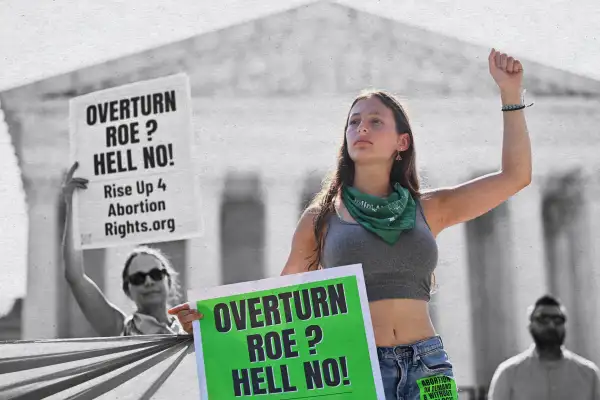Roe v. Wade Overturned: 12 Ways Abortion Bans Will Hurt Americans Financially

The United States Supreme Court overturned the landmark legal decision Roe v. Wade on Friday, ending Americans' constitutional right to abortion 49 years after establishing it nationwide. The court returned the power to regulate abortion to individual states — and, in doing so, set into motion a series of financial consequences for people who can become pregnant.
In a dissenting opinion on Dobbs v. Jackson Women's Health Organization, Justices Sonia Sotomayor, Elena Kagan and Stephen Breyer specifically pointed out that allowing each state to determine its own abortion laws disadvantage "the poor woman who cannot get the money to fly to a distant State for a procedure." Roughly half of states intend to limit access to or completely prohibit abortion, according to the New York Times.
"Above all others, women lacking financial resources will suffer from today’s decision," the dissenting justices wrote, adding that some states may stop people from obtaining abortions or medications out of state. "Those who can't obtain abortions may undergo pregnancy and have a child, but at significant personal or familial cost."
U.S. Treasury Secretary Janet Yellen, too, predicted last month that overturning Roe would have "very damaging effects on the economy." She argued that legalizing abortion in the '70s enabled Americans to balance their families and careers, which in turn had "a favorable impact on the well-being and earnings of children."
Financial impact of Supreme Court abortion decision
Previous research has shown that abortion restrictions at the state level cost the economy $105 billion a year. Though the exact cost of the ruling is hard to pinpoint right now, here are 12 facts about the link between abortion and Americans' money:
• When asked to name the reason(s) they wanted an abortion, 73% of patients in a 2004 survey said they couldn't afford to have the child.
• According to the Turnaway Study, people who can't obtain abortions see a spike in household poverty for at least four years after giving birth (when compared to those who can).
• Parents denied abortions have more trouble paying for everyday expenses like housing and food.
• There's evidence that patients who cannot get abortions see their credit scores drop after giving birth, according to a 2020 University of Michigan study.
• They're also more likely to experience bankruptcy or get evicted — both of which can negatively impact a person's credit score.
• Raising a kid costs the average set of married, middle-class parents about $233,610, according to the U.S. Department of Agriculture.
• The average early-term abortion conducted in a non-hospital setting with anesthesia costs $508.
• Mothers experience a "wage penalty" of 4% for each child. The impact is more prevalent, and bigger, among low-income workers than high-wage earners, according to a 2014 study by the think tank Third Way.
• Low-income Americans are about five times more likely than affluent ones to have an unintended pregnancy.
• Young people who have abortions to delay pregnancies by a year end up seeing an 11% uptick in hourly wages, according to an amicus brief filed last September by 154 economists.
• Young patients, and particularly young Black patients, who are able to terminate their unintended pregnancies are more likely to finish college and start professional careers.
• Per the U.S. Bureau of Labor Statistics, less than a quarter of workers in the private sector have access to paid family leave. Just 26% of state and local government employees do.
More from Money:
Where to Donate to Support Abortion Access Right Now
Women Are Buying Up Plan B Because They're Terrified of the Supreme Court
One in Four Americans Are Skipping Medical Treatment Because They Worry About the Cost

